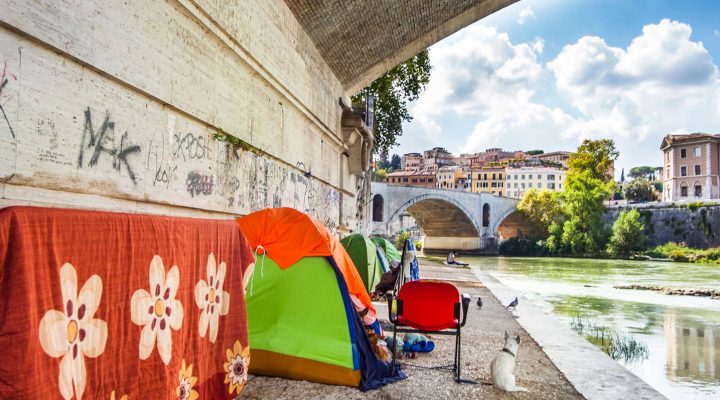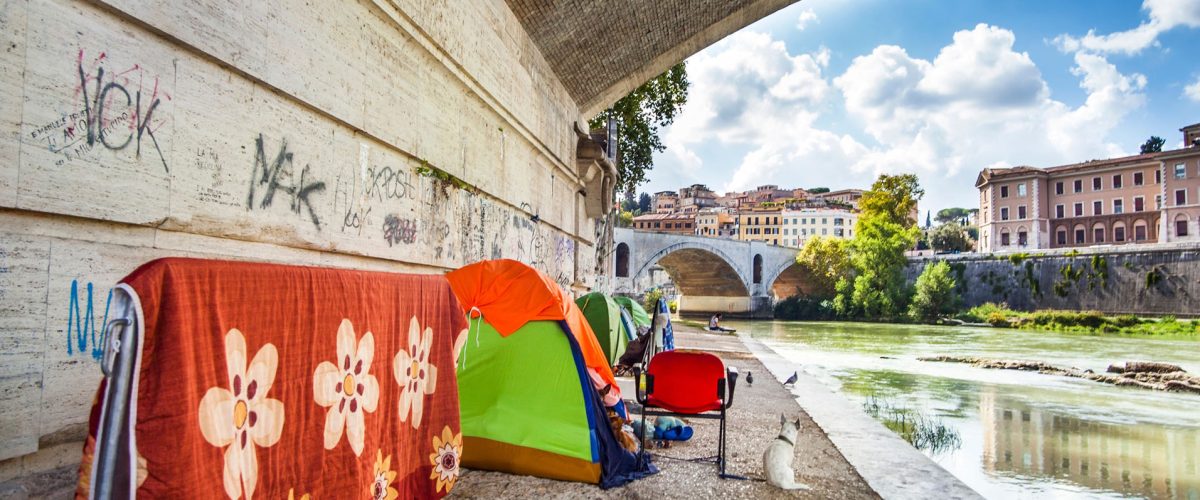My wife and I were in the mountains of North Carolina (Bakersville) for a week and a half during the Christmas season staying in what used to be her parents’ home. On a few days it was cold, bone-chilling cold. It was arctic outside. How does a wind chill of -17 sound!
This time in the mountains reminded me of how I and my family felt during an electrical outage in Charlotte, N.C., about 10 years ago. We had an ice storm and our power was out for 10 days. Think about not having power for 10 days in the dead of winter. What made it particularly hard was our neighbors across the street, whose power line was underground, had power. It’s really annoying not to have electricity when you can look across the street and see lights on.
For 10 days, we were bone cold. We stayed with our elderly neighbor next door who had gas logs, but the logs didn’t put out very much heat. It was better than nothing, and with blankets we survived. My wife noted that all of it made her empathize with homeless people during the winter. Like homeless people, we had to deal with the cold first and foremost. Like the homeless, we spent a lot of time just trying to survive.
“Unlike homeless people, we were able to go to heated movie theaters and to go out to eat at restaurants.”
Unlike homeless people, we were able to go to heated movie theaters and to go out to eat at restaurants. We did get some relief. Homeless people often depend on the generosity of people, on shelters and churches.
In Charlotte, we have an organization, Urban Ministry Center, that has a program to help our homeless neighbors during the winter months. Here are some statistics and some information, which although a little outdated, gives you an impression of just how important this ministry is.
“From December 1, 2018, through March 31, 2019, Room in the Inn provided a total of 16,407 overnight accommodations to 1,494 different people. Each year, nearly 5,000 Room in the Inn volunteers throughout the community help in some way: registering neighbors, driving, making dinner and serving dinner, chaperoning overnight, making sandwiches for lunch or simply sharing a meal and conversation.”
The church I served as pastor was among the first churches willing to participate in Room in the Inn. Many churches, ironically, were scared of ministry with the homeless, even though as Mother Teresa noted, “Jesus is in the distressing disguise of the poor.”
So, in addition to hosting Room in the Inn once a month, our small church trained three other churches that had volunteers willing to serve, who were enthusiastic about staying overnight in our Fellowship Hall with the homeless, feeding them and transporting them. Their churches would not yet allow them to host on their property, but they could get some experience with the homeless under their belt and hopefully convince their church in the near future to host.
I’m happy to report all the churches we let use our Fellowship Hall eventually hosted Room in the Inn at their church. One of the things that really helped was the Urban Ministry Center evaluated every participant with a breathalyzer and determined if each homeless guest was under the influence of drugs.
“We were served Communion by Jesus in the distressing disguise of the poor.”
We did several things to make our homeless guests feel welcome. Rather than “putting our Christian ministry” on them, we let them take the lead on many things. We invited them to say the blessing at meals, we invited them to church, unlike many churches that got the homeless off their property as soon as they could on Sunday mornings. Why wouldn’t you invite homeless people to church? We encouraged our homeless neighbors to sing in the choir, take up the offering, and serve Communion. Yes, we were served Communion by Jesus in the distressing disguise of the poor.
If Jesus is present in your worship service, why would you not involve Jesus in the worship, even ask Jesus to serve Communion? I can’t tell you how many times our homeless guests cried when I asked them to serve Communion. Most churches don’t want their “holy worship” messed up, and homeless guests participating in their service would be out of the question.
On the Saturdays we hosted Room in the Inn, we always had a fellowship meal after worship so we could feed the homeless before they departed. Room in the Inn participants especially liked our annual chili contest, which was held in January.
We did two really nice things for our homeless guests. We got an ex-convict in our congregation who was a deacon, who was very handy and mechanical, to put a shower in the lower floor of our Fellowship Hall. The other thing our homeless guests really appreciated was that we bought them weekly bus passes.
We felt we really set the standard on how to treat homeless people. We were proud we did more than other churches. You have to be careful about being proud, cautious of feeling superior when it comes to ministry. Ministry is not about the one person doing something for another person. Ministry is a two-way street. The homeless minister to us, and if we focus on our good deeds, we miss what Jesus is, and was, all about.
“In less than 10-degree weather, they got their few possessions out of my car and climbed up the cement structure underneath the bridge.”
Which leads me to when I and my church let Jesus down. One Sunday in February, it was so cold. I can’t remember the exact temperature, but it was below 10 degrees. After lunch we loaded three homeless neighbors in my car for me to take to uptown Charlotte. The Urban Ministry Center would not open until 5 p.m. It was 2:30. I asked our homeless neighbors where they wanted me to let them out. They told me they wanted me to take them to a location underneath a bridge. In less than 10-degree weather, they got their few possessions out of my car and climbed up the cement structure underneath the bridge and sat down in a location that would best protect them from the blistery wind. I drove off, feeling … feeling like I had let Jesus down, a sick feeling in my stomach, knowing what I had just done was very wrong.
My church could have kept the homeless in our Fellowship Hall until 4:30 and taken them to the Urban Ministry when it opened, keeping our homeless guests out of the cold. Or, we could have hired someone to do a homeless ministry at our church and we could have hosted the homeless every night of the winter. Look at your church’s budget and notice how much of the budget is directed to homeless ministry. Still yet, we also could have incorporated a homeless family into our congregation.
Will Campbell, one of the few Southern Baptist prophets in the last 50 years, said when he traveled from town to town on speaking engagements, he noticed there were about as many homeless people in each town or city as there were churches. If each church would incorporate at least one homeless person or homeless family into the life of the church, homelessness would be solved.
Campbell, when he preached at Myers Park Baptist Church in Charlotte, a church located in a wealthy area with some very well-to-do members, said the thing they needed most, more than anything else, was for a homeless person to enter their sanctuary and urinate all down the aisle. That’s perhaps true for many of us and our churches.
Churches simply don’t want Jesus in the distressing disguise of the poor in their church. They want to do their Christian good deeds, but nothing more. Churches can do better, and must do better, if we are to follow Jesus.
Chris Ayers was pastor of Wedgewood Church in Charlotte, N.C., for 30 years. He earned master of divinity and master of theology degrees at Southeastern Theological Seminary and a doctor of ministry degree from Columbia Theological Seminary.
Related articles:
Faith-based groups lead the way in serving nation’s homeless


